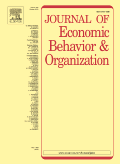
This article examines the evolutionary stability of other-regarding preferences in a group contest for a prize, which is endogenously determined. In a destructive contest, such as war, contest e¤orts of all groups decrease the value of the prize. In contrast, in a productive contest, such as a patent race, contest e¤orts of all groups increase the value of the prize. The indirect evolutionary approach allows to endogenize players’preferences, that is, the utility weights given by a group member, in her subjective utility function, to the mater- ial payo¤s of in-group and out-group members. After characterizing the set of evolutionarily stable preference types, I show that the evolutionary stable degree of in-group altruism is always stronger when the group contest is destructive than when it is productive. Moreover, when the group contest is strongly productive, preference evolution leads to in-group spite. However, a smaller group size and a larger number of competing groups makes this outcome less likely.
